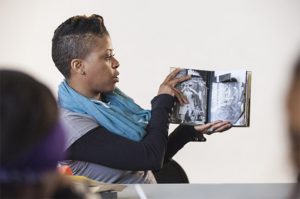Session 2 participant. Creative Justice 2015. Timothy Aguero Photography.

Incarceration alternative advances individual and systemic transformation
June 17, 2016 – 4Culture’s Creative Justice, an arts-based alternative to incarceration for young people in King County, Washington has been recognized with a Public Art Network (PAN) Year in Review award.
Piloted in 2015, the program is funded by Percent for Art revenue generated through the design and construction of the county’s new Children and Family Justice Center—which will collocate the region’s juvenile court and jail—and a generous grant from the National Endowment for the Arts.
Forty eight youth facing criminal charges worked with mentor artists – Aaron Counts, Daemond Arrindell, Nikkita Oliver, Otieno Terry, and Shontina Vernon – instead of being detained. In exchange for their creative work and through partnership with the Prosecuting Attorney’s Office, participants received community service credit, cash stipends, and a range of court benefits. Of the 48 participants, 29 had their charges dismissed. King County is now asking that the program be expanded in 2016 and beyond.

Creative Justice is one of 38 outstanding public artworks to be honored by Americans for the Arts, the nation’s leading nonprofit organization for advancing the arts and arts education. PAN is the only national program that specifically celebrates the most compelling public art. Three of the projects recognized this year were supported by Washington State organizations.
Creative Justice, 4Culture’s newest socially engaged initiative, offers an arts-based alternative to incarceration for court-involved young people, intentionally designed to empower individual and systemic transformation.
Professionally trained mentor artists engage participants in community-centered, multi-disciplinary arts learning experiences. The youth are taught within a trauma-informed framework that recognizes healing is a fundamental part of addressing the needs of communities impacted by oppression, and a cultural curriculum that equips them with the skills and insights to dismantle structures of racism and rebuild a world that supports their wholeness.










